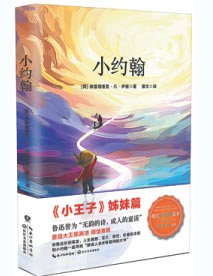Fresh take on Dutch classic fairy tale
 0 Comment(s)
0 Comment(s) Print
Print E-mail China Daily, October 24, 2017
E-mail China Daily, October 24, 2017
 |
|
The new Chinese translation of Little Johannes was published recently, around 90 years after late Chinese writer Lu Xun's original was first published. [Photo provided to China Daily] |
Described as the "poem without rhyme, a fairy tale for adults" by modern Chinese writer Lu Xun (1881-1936), a new Chinese translation of De Kleine Johannes (Little Johannes) was published in September, around 90 years after Lu Xun's original was first published.
Written by Frederik van Eeden, Little Johannes is a classic Dutch fairy tale from the 19th century. It's a fantastical adventure of the boy, Little Johannes, who lives with his father, his dog and a cat, and one night starts a journey to find the book that can "solve all the questions of mankind".
Little Johannes meets Windekind, Wistik, Pluizer and Doctor Cypher in his fantasy world, all symbols for the different stages of life while growing up.
He faces the harsh realities of the world and the emptiness of hopes for a better afterlife, but in the end chooses to embrace the bittersweet reality of life.
The story is a reflection of Eeden's own experience of youth, where he was urged to leave behind his childhood fantasies and grow up and learn more about the world.
As one of the most popular writers in the Netherlands, Eeden was also a doctor and a psychoanalyst. Published in 1887, Little Johannes has proved popular ever since and has often been referred to as the 19th century's Le Petit Prince.
Published by Changjiang Literature and Art Publishing House, the new Chinese version of Little Johannes has been translated by Jing Wen, who admits to falling in love with the story from the first time she read it.
"It's a noble artistic work that combines beautiful poetic prose with profound philosophical thought," Jing says.
"Little Johannes' love goes beyond mankind, gods, gender, animals and plants. In the end, he is not a pure child any more. He turns out to be brave and responsible enough to face the difficulties of life."
As the planner behind Selected Works of Lu Xun, Jing first read Lu Xun's translation of Little Johannes in 2011.
"It's like a pretty person in ancient clothes. No matter how antiquated the clothes are, the pure beauty inside cannot be hidden," Jing says.
Lu Xun first read Little Johannes in 1906 in a German literature magazine and became fascinated by the story. It took him 20 years to translate it from German and publish the story in Chinese.
Inspired by the fairy tale, Lu Xun set aside his sharpened style and wrote a soft prose collection entitled Dawn Blossoms Plucked at Dusk.
Lu Xun even refused a nomination for the Nobel Prize in literature because of the book, which he said he could improve on and regarded unfair to accept since Eeden had never been awarded the prize.
Lu Xun's translation from German was written in a half-literary, half-vernacular style, so Jing decided to translate the work into contemporary language to allow more people to enjoy its beauty.
Starting in 2015, it took Jing two years to translate the book from English. Since the Dutch version could not be found in China, she enlisted the help of the Dutch Literature Fund.
"They sent me precious material in English about the writer's life and comments about him from contemporary writers," Jing says.
Li Xinyu, a scholar of Lu Xun and professor at Nankai University, says: "Jing Wen's translation is fluent and vivid as the original writing of the book and also keeps the essence of Lu Xun's version."
Ineke van de Pol, head of the Press and Cultural Department at the Dutch embassy in Beijing, says: "Little Johannes is first and foremost a children's book. It teaches very important values to children about the good and the bad, the search for happiness, the importance of nature and positivism.
"On the other hand, its topics are relevant for people of all ages."
In 2011, the Netherlands was the focus of the Beijing International Book Fair and the Dutch Fund for Literature organized a major literary showcase in the Chinese capital.
"The Dutch Fund for Literature has invested a lot in the Chinese market in the past decade, which has resulted in numerous translations and an ever-growing interest in Dutch literature of all genres," Van de Pol says.
This year marks the 45th anniversary of the establishment of diplomatic relations between China and the Netherlands.
Bas Pulles, deputy head of mission from the embassy of the Netherlands in Beijing, says the history of relations between the two countries can be traced back far longer than that.
"Ties have traditionally been built on trade, but in recent history more and more exchanges in cultural fields including literature have taken place," says Pulles.
The Netherlands is well known for its children's stories and 25 percent of all books sold in the country are children's books. Miffy by Dick Bruna is an iconic example and is loved by many Chinese people.
"There are now over 200 Dutch children's books which have been translated and published in China. I'm delighted that Little Johannes is one of those," Pulles says. "The book is a true classic, and its theme is universal."
"It's also our goal to encourage more collaboration with China in this field by building partnerships with publishing houses."






Go to Forum >>0 Comment(s)